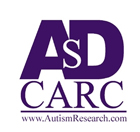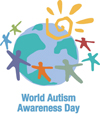 |
 |
Canadian Autism Researchers Mark World Autism Awareness Day |
The Autism Spectrum Disorders—Canadian-American Research Consortium celebrates the upcoming World Autism Awareness Day (April 2nd, 2009) by acknowledging the unique contributions and achievements of individuals on the spectrum and their families around the world. We would also like to acknowledge the support and involvement of the thousands of families and individuals participating in our ASD research who share their first-hand experiences to make our work possible.
This occasion is a time to reflect on the many lifelong challenges and barriers facing this population and the importance of world-wide investment in ongoing collaborative ASD research to broaden current understanding of the complex realities of ASDs. Researchers around the globe are working to better understand the causes of ASDs and to ensure more timely methods of diagnosis, early intervention and effective treatment and service practices for children and adults on the spectrum. Increased knowledge sharing and collaboration among international researchers is bringing greater attention to ASD issues and contributes to reducing the severe barriers and disadvantages faced by many individuals with ASD conditions and their families in developing countries.
It is estimated that over 60 million individuals are affected by autism world-wide. Most are living in countries where there is little or no access to treatment and public services. Incidence of autism is now as high as 1/150 with rates appearing to be increasing across the globe.
“These are not just statistics,” says ASD-CARC Director Jeanette Holden. “Families dealing with autism have very complex needs and, even in Canada, diagnosis can be slow and systems of care fragmented and frequently very difficult to navigate. Intervention for children could begin much earlier if clinicians and researchers were able to work together to identify signs in the first year of life and better understand the genetic and other characteristics of ASDs which affect susceptibility and determine specific outcomes. The more we can learn, the better we are able to minimize the impacts of ASD conditions, support these families, and build a brighter future for these children.”
Researchers play an active and essential role in ensuring the health and well-being of people with ASDs. Innovative and promising new research is focusing on the genetic and environmental causes of autism, the creation of extensive data sets, neurobiology of ASDs, psychological and developmental processes and comparative work on effective treatments and interventions.
Canadian funding for ASD science is noticeably modest by international standards. With over 200,000 Canadians living with ASD conditions, ASD-CARC encourages the federal government to ensure Canadian research leadership in this field by significantly increasing dedicated funding for autism-specific research. Targeted funding will reduce long-term health and social costs by accelerating Canadian research that holds great promise for building our understanding of autism and how to more effectively help people with ASDs across their lifespan.
The Autism Spectrum Disorders—Canadian-American Research Consortium is an interdisciplinary team of more than 60 researchers and clinician-scientists, working with 3000 families in Canada and the United States. We are dedicated to understanding the Autism Spectrum in order to ensure better futures for individuals with autism and their families. The Consortium is also one of the leading autism research organizations in the world, having funding from several organizations including the Canadian Institutes of Health Research (CIHR), Autism Speaks, the Ontario Mental Health Foundation, and the Michael Smith Foundation for Health Research.
| SITE MAP STUDIES |
QUESTIONNAIRES
MY ACCOUNT
CONTACT US
| Q–GLO LOOKING FOR SOMETHING? |





